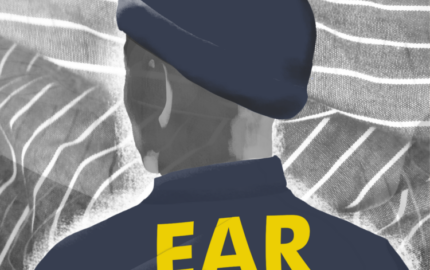“In the midst of life I woke to find myself living in an old house beside Brick Lane in the East End of London.”
“The only place in London where you can talk to people, and there is a culture of openness, is the East End.”
The tagline for the wonderful London blog called “Spitalfields Life” resonated deeply with me, and not only because I woke in the midst of life to find myself doing the exact same thing. The line has everything: wonderful rhythm, a sense of wonder, a sense of history and place.
Over a cup of tea, I asked the blog’s writer, who goes by the Austen-ish pseudonym “The Gentle Author” (hereafter known as TGA), about coming up with the line.
“I suppose it incarnates the moment when I started, which was a moment of being in the middle of my own life, and the middle of the life of the city,” TGA says. “And the sense that this particular part of the city is a kind of heart, a kind of a center of a whirlwind of life and existence.”
The enormously popular blog is nominally about the Spitalfields area of East London, a neighborhood of beautiful early Georgian homes that look like they belong on a movie set (and often do), the Bangladeshi curry houses of Brick Lane and a street with an 18th-century church by Nicholas Hawksmoor at one end and a mosque that was once a synagogue that was once a church on the other.

But even though the blog is imbued with the history of the place and its buildings, it’s really about the East Enders who are woven into the fabric of the neighborhood – perhaps a fitting metaphor for an area whose early residents were Huguenot silk weavers. The East End, long known for its poverty but also its open-heartedness, attracted the writer.
“I found it very alienating when I first came to London in 1980 and discovered the mysterious phenomena of this city whereby in public places people pretend that the other person isn’t there,” TGA says. “It’s a tragic thing. The only place in London where you can talk to people, and there is a culture of openness, is the East End.”
The Gentle Author started the blog, which tells the stories of the everyday people of the East End, after caring for a parent in the years before her death. The writer was grateful for the nurses who helped out, and it opened the writer’s eyes to the “invisible people” who help keep the world running.
“That is partly what inspired this idea to write about the people that no one else writes about. And to write the stories that no one else is interested to write,” TGA says. “That is very much the foundation of Spitalfields Life.”
But there’s a gimmick to the blog, revealed in what you might call its mission statement:
“My Promise”:
Over the coming days, weeks, months and years, I am going to write every single day and tell you about life here in Spitalfields at the heart of London. How can I ever describe the exuberant richness and multiplicity of culture in this place to you? This is both my task and my delight.
Let me disclose to you the hare-brained ambition I am pursuing, which is to write at least ten thousand stories about Spitalfields life. At the rate of one a day, this will take approximately twenty-seven years and four months. Who knows what kind of life we shall be living in 2037 when I write my ten thousandth post?
For those who were in awe of The Julie/Julia Project, in which blogger Julie Powell wrote about cooking all 524 recipes in Julia Child’s “Mastering the Art of French Cooking,” this turns the volume up to 11, to borrow from “Spinal Tap.” There’s a strong hint of obsession about Spitalfields Life.
“The best blogs have an overarching drama. For me, the overarching drama was, how could someone do this every day?” TGA says. “I think the best writing comes out of obsession.
“Samuel Beckett believed novels were essentially a lie, because all the threads have to be tied up at the conclusion when the only real end is the death of the writer. I feel compelled to go on until I drop and I know the ultimate outcome will be my death.”

But how does TGA manage to write a post every single day – and many of them are beautifully crafted, deeply reported profiles of East Enders, with recurring characters like Paul Gardner, whose bag shop has been in the family for more than a century, and Mick Taylor, “the sartorialist of Brick Lane”?
“How do you put together a dinner every day? It’s part of what you do,” TGA says. “What I found in the early years was that the more ambitious the stories were, the greater the number of readers were. So I became more and more compelled to do more ambitious stories and I made myself very ill. Now I am well again and I have learnt that contrast is a good thing. You can do a complicated story and a simpler one the next day.”
Spitalfields Life has resonated deeply with readers, and created a global community. The writer says that’s been the most uplifting thing about nearly nine years of blogging, which TGA sees as “introducing people to each other, as simple as that.”
“People shared the stories with other people, and it grew into a worldwide audience,” TGA says. “What I’ve hoped I’ve proved is that it is possible for an unknown writer to discover a readership and have a relationship with them.”
“The best blogs have an overarching drama. For me, the overarching drama was, how could someone do this every day? … I think the best writing comes out of obsession.”
As someone who takes enormous care with the writing and reporting of the posts, The Gentle Author doesn’t understand why the blogging realm shouldn’t be one of quality.
“When I meet people and they ask what I do, I say, ‘I’m a writer.’ They say, ‘That’s very interesting, what do you write?’ And I say, ‘A blog.’ And that’s usually the end of the conversation. But there’s no reason why any literary writing form couldn’t have value, yet blogs aren’t taken seriously as writing.
“So that was the mission, to take this whole thing very seriously and do it with love and dedication. It was more exciting for me to do this in an arena that was perceived to be trash.”
OK, then why the anonymity? One reason is what The Gentle Author calls a fundamental structural flaw to blogging.
“It can become overwhelmingly egotistical. My solution was to absent myself. I want to foreground the person I’m talking to or writing about. I found it very liberating to be not defined by my gender or my class or my race.
“But I also wanted the readers to own it, to have emotional ownership. By the absence of me, it allows them to do that, to imagine who the person on the other side of this is. We can be more intimate because we don’t know each other.”
And the name, The Gentle Author? Once again, the word “intimacy” comes up.
“I really love 19th century fiction and the sense of intimacy. It’s almost like talking in the dark, in bed.”
And in a city like London, where people seem to hide behind their phones for fear of engaging with strangers, a little bit of intimacy is a grand thing.



